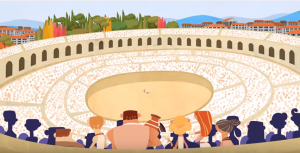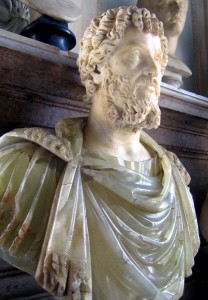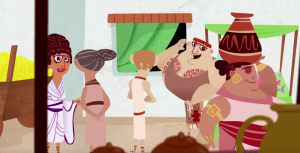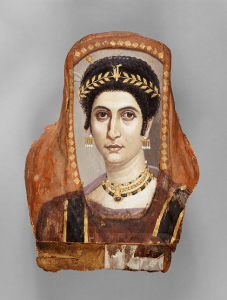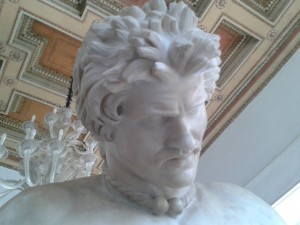
Introduction –
Ancient Rome had through much of its history an incredibly diverse population. At the point in which the Empire expanded to its furthest limit we find Rome a city of wondrous variety. Hairstyles and fashion from all the nations of the Empire could be seen in the city, and their languages and accents could be heard on its streets and public places. What did Romans think of these foreigners who were constantly becoming incorporated into the city’s population?
In this blog you will find ancient literary sources which shed some light on what Romans thought of the world around them and of the various people who lived together in the crowded and bustling city of Rome.

Contents
1. Diversity in Rome
2. The World According to The Romans
3. Roman View of Foreigners
4. The Attraction to Rome
5. Imagining a Roman Street Scene
Diversity in Rome
Cicero
This is Rome, a state formed by the gathering of nations.
(Q. Cic. Pet. 14, click for link)
Athenaeus
How many nationalities are present in Rome according to Athenaeus? Can you locate these places on a modern day map? Which nationality does Athenaeus say is the best? Can you guess the nationality of Athenaeus?
Rome may fairly be called the nation of the world. And he will not be far out who pronounces the city of the Romans an epitome of the whole earth; for in it you may see every other city arranged collectively, and many also separately; for instance, there you may see the golden city of the Alexandrians, the beautiful metropolis of Antioch, the surpassing beauty of Nicomedia; and besides all these that most glorious of all the cities which Jupiter has ever displayed, I mean Athens. And not only one day, but all the days in an entire year, would be too short for a man who should attempt to enumerate all the cities which might be enumerated as discernible in that uranopolis of the Romans, the city of Rome; so numerous are they.—For indeed some entire nations are settled there, as the Cappadocians, the Scythians, the people of Pontus, and many others.
(Athenaeus, The Deipnosophists, 1.36, click for link)
The World According to the Romans

Sea Monster, Sala Rotunda, Vatican Museums, Rome. Credit: Julia Peters
What do you think the following extract from Pliny’s Natural History tells us about the Roman’s view of the world?
Pliny
In the vicinity also of those who dwell in the northern regions, and not far from the spot from which the north wind arises, and the place which is called its cave, and is known by the name of Geskleithron, the Arimaspi are said to exist, whom I have previously mentioned, a nation remarkable for having but one eye, and that placed in the middle of the forehead. This race is said to carry on a perpetual warfare with the Griffins, a kind of monster, with wings, as they are commonly represented, for the gold which they dig out of the mines, and which these wild beasts retain and keep watch over with a singular degree of cupidity, while the Arimaspi are equally desirous to get possession of it.
On many of the mountains again, there is a tribe of men who have the heads of dogs, and clothe themselves with the skins of wild beasts. Instead of speaking, they bark; and, furnished with claws, they live by hunting and catching birds. According to the story, as given by Ctesias, the number of these people is more than a hundred and twenty thousand: and the same author tells us, that there is a certain race in India, of which the females are pregnant once only in the course of their lives, and that the hair of the children becomes white the instant they are born. He speaks also of another race of men, who are known as Monocoli, who have only one leg, but are able to leap with surprising agility. The same people are also called Sciapodæ,: because they are in the habit of lying on their backs, during the time of the extreme heat, and protect themselves from the sun by the shade of their feet. These people, he says, dwell not very far from the Troglodytæ; to the west of whom again there is a tribe who are without necks, and have eyes in their shoulders.
Nature, in her ingenuity, has created all these marvels in the human race, with others of a similar nature, as so many amusements to herself, though they appear miraculous to us. But who is there that can enumerate all the things that she brings to pass each day, I may almost say each hour? As a striking evidence of her power, let it be sufficient for me to have cited whole nations in the list of her prodigies.
(Pliny, NH, 7.2., click for link)
Roman View of Foreigners
The emperor Claudius, as recorded by Tacitus, explains to the Roman senate why the men of Gaul should be given the right to obtain public office. In your own words, how does Claudius justify his decision? Do you find his argument convincing?
Tacitus
In my own ancestors, the eldest of whom, Clausus, a Sabine by extraction, was made simultaneously a citizen and the head of a patrician house, I find encouragement to employ the same policy in my administration, by transferring hither all true excellence, let it be found where it will. For I am not unaware that the Julii came to us from Alba, the Coruncanii from Camerium, the Porcii from Tusculum; that — not to scrutinize antiquity — members were drafted into the senate from Etruria, from Lucania, from the whole of Italy; and that finally Italy itself was extended to the Alps, in order that not individuals merely but countries and nationalities should form one body under the name of Romans. The day of stable peace at home and victory abroad came when the districts beyond the Po were admitted to citizenship, and, availing ourselves of the fact that our legions were settled throughout the globe, we added to them the stoutest of the provincials, and succoured a weary empire. Is it regretted that the Balbi crossed over from Spain and families equally distinguished from Narbonese Gaul? Their descendants remain; nor do they yield to ourselves in love for this native land of theirs. What else proved fatal to Lacedaemon and Athens, in spite of their power in arms, but their policy of holding the conquered aloof as alien-born? But the sagacity of our own founder Romulus was such that several times he fought and naturalized a people in the course of the same day! Strangers have been kings over us: the conferment of magistracies on the sons of freedmen is not the novelty which it is commonly and mistakenly thought, but a frequent practice of the old commonwealth… Now that customs, culture, and the ties of marriage have blended them with ourselves, let them bring among us their gold and their riches instead of retaining them beyond the pale!
(Tacitus, Annals 11.24 click for link)
Horace, writing to the emperor Tiberius, claims that the conquered peoples of the Roman Empire ‘worship’ their Emperor. The nations are both named and alluded to by reference to rivers. This method of description gives the reader a mental image of how vast an area is encompassed by the Roman Empire. Note how each nation is characterized. Do you find these characterizations positive or negative? Does Horace intend Tiberius to be pleased that these people worship him?
Horace (1st century BC/1st century AD)
The Spaniards, never conquered before, the Medes,
the Indians, marvel at you, the roving
Scythians, O eager protector
of Italy and Imperial Rome.
The Nile, that conceals its origin, hears you,
the Danube hears, and the swift-flowing Tigris,
the Ocean, filled with monsters, roaring
around the distant island of Britain,
and the regions of Gaul, unafraid of death,
and the stubborn Iberian land, hear you:
Sygambri, delighting in slaughter,
stand, with grounded weapons, worshipping you.
(Horace, Odes, 4.14.41-52 click for link)
Poet Martial describes a scene in the Colosseum in which spectators from all over the Empire gather to see the games. Like Horace, Martial uses characterizations to identify the different nationalities. What do Martial’s descriptions tell us about these different cultures? What is Martial trying to communicate in this extract from de Spectaculis?
Martial
WHAT race is set so far, what race so barbarous,
Caesar, wherefrom a spectator is not in thy city ?
There has come the farmer of Rhodope from Orphic
Haemus, there has come too the Sarmatian fed on
draughts of horses’ blood, and he who quaffs at its
spring the stream of first-found Nile, and he 3 whose
shore the wave of farthest Tethys beats ; the Arab
has sped, Sabaeans have sped, and Cilicians have
here been drenched in their own saffron dew. 4 With
hair twined in a knot have come Sygambrians, and,
with locks twined elsewise, Aethiopians. Diverse
sounds the speech of the peoples, yet then is it one
when thou art acclaimed thy country’s Father true.
(Martial, de spectaculis, 3, click for link)
Many of the foreigner’s residing in Rome were slaves or of slave origin. In a law found in Uplian’s Digest it is required that the nationality of a slave be declared to prospective buyers. What reason is given in the text for this? What can this law tell us about Roman prejudices to other nationalities?
Ulpian
Persons who sell slaves should always state their nationality, at the time of the sale, for very frequently the place of the nativity of a slave either attracts or deters the purchaser, and hence it is to our interest to know in what country he was born; for it is presumed that some slaves are good because they are sprung from a nation which has not an evil reputation, and others are considered to be bad because they are derived from a nation which is rather disreputable than otherwise. If the origin of the slave was not mentioned, an action on this ground will be granted to the purchaser and to all those interested in the matter, by means of which the purchaser can compel a slave to be taken back.
(Ulpian, Digest, 21.1.31.21 click for link)
The law above tells us that Romans thought of foreigners differently depending on their nationality. To better understand the Roman view of foreigners let’s look at descriptions of different nationalities found in ancient literature.
Greeks
Using evidence in the texts below, what positive and negative views do you find of Romans towards Greeks? What do you think influenced negative views of the Greeks?
Cicero
But I say this of the whole race of Greeks; I allow them learning, I allow them a knowledge of many arts; I do not deny them wit in conversation, acuteness of talents, and fluency in speaking; even if they claim praise for other sorts of ability, I will not make any objection; but a scrupulous regard to truth in giving their evidence is not a virtue that that nation has ever cultivated; they are utterly ignorant what is the meaning of that quality, they know nothing of its authority or of its weight.
(Cic. Pro Flacco, 9 click for link)
Juvenal
And What About all Those Greeks?
That race most acceptable now to our wealthy Romans,
That race I principally wish to flee, I’ll swiftly reveal,
And without embarrassment. My friends, I can’t stand
A Rome full of Greeks, yet few of the dregs are Greek!
…See, Romulus, those rustics of yours wearing Greek slippers,
Greek ointments, Greek prize medallions round their necks.
He’s from the heights of Sicyon, and he’s from Amydon,
From Andros, Samos, they come, from Tralles or Alabanda,
Seeking the Esquiline and the Viminal, named from its willows.
To become both the innards and masters of our great houses.
Quick witted, of shamelessly audacity, ready of speech, more
Lip than Isaeus, the rhetorician. Just say what you want them
To be. They’ll bring you, in one person, whatever you need:
The teacher of languages, orator, painter, geometer, trainer,
Augur, rope-dancer, physician, magician, they know it all,
Your hungry Greeks: tell them to buzz off to heaven, they’ll go.
…Should I not flee these people in purple? Should I watch them sign
Ahead of me, then, and recline to eat on a better couch than mine,
Men propelled to Rome by the wind, with the plums and the figs?
Is it nothing that in my childhood I breathed the Aventine air,
Is it nothing that in my youth I was nurtured on Sabine olives?
(Juvenal, Sat. 3, click for link)
Plutarch – Life of Cato
Seeking to prejudice his son against Greek culture, he indulges in an utterance all too rash for his years, declaring, in the tone of a prophet or a seer, that Rome would lose her empire when she had become infected with Greek letters. But time has certainly shown the emptiness of this ill-boding speech of his, for while the city was at the zenith of its empire, she made every form of Greek learning and culture her own.
(Plutarch, Life of Cato, 23.3, click for link)
Gauls
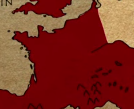
In what ways did the ancient Romans find Gauls different to themselves?
Diodorus Siculus
The Gauls are tall of body, with rippling muscles, and white of skin, and their hair is blond, and not only naturally so, but they also make it their practice by artificial means to increase the distinguishing colour which nature has given it. For they are always washing their hair in lime-water, and they pull it back from the forehead to the top of the head and back to the nape of the neck, with the result that their appearance is like that of Satyrs and Pans, since the treatment of their hair makes it so heavy and coarse that it differs in no respect from the mane of horses. Some of them shave the beard, but others let it grow a little; and the nobles shave their cheeks, but they let the moustache grow until it covers the mouth. Consequently, when they are eating, their moustaches become entangled in the food, and when they are drinking, the beverage passes, as it were, through a kind of a strainer.
(Diodorus Siculus, V.28.1 click for link)
The Gauls are terrifying in aspect and their voices are deep and altogether harsh; when they meet together they converse with few words and in riddles, hinting darkly at things for the most part and using one word when they mean another; and they like to talk in superlatives, to the end that they may extol themselves and depreciate all other men. They are also boasters and threateners and are fond of pompous language, and yet they have sharp wits and are not without cleverness at learning.
(Diodorus Siculus, V. 31.1 click for link)
Britons
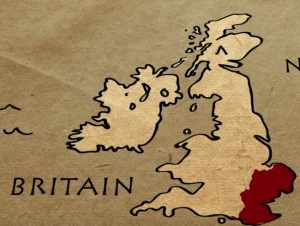
What did ancient Romans find shocking about the Britons? For the language in the following texts, what do you think the Romans admired about them?
Cassius Dio
There are two principal races of the Britons, the Caledonians and the Maeatae, and the names of the others have been merged in these two. The Maeatae live next to the cross-wall which cuts the island in half, and the Caledonians are beyond them. Both tribes inhabit wild and waterless mountains and desolate and swampy plains, and possess neither walls, cities, nor tilled fields, but live on their flocks, wild game, and certain fruits; for they do not touch the fish which are there found in immense and inexhaustible quantities. They dwell in tents, naked and unshod, possess their women in common, and in common rear all the offspring. Their form of rule is democratic for the most part, and they are very fond of plundering; consequently they choose their boldest men as rulers. They go into battle in chariots, and have small, swift horses; there are also foot-soldiers, very swift in running and very firm in standing their ground. For arms they have a shield and a short spear, with a bronze apple attached to the end of the spear-shaft, so that when it is shaken it may clash and terrify the enemy; and they also have daggers. They can endure hunger and cold and any kind of hardship; for they plunge into the swamps and exist there for many days with only their heads above water, and in the forests they support themselves upon bark and roots, and for all emergencies they prepare a certain kind of food, the eating of a small portion of which, the size of a bean, prevents them from feeling either hunger or thirst.
(Cassius Dio, Roman History, 77.12.1, click for link)
Herodian
Strangers to clothing, the Britons wear ornaments of iron at their waists and throats; considering iron a symbol of wealth, they value this metal as other barbarians value gold. They tattoo their bodies with coloured designs and drawings of all kinds of animals; for this reason they do not wear clothes, which would conceal the decorations on their bodies.
Extremely savage and warlike, they are armed only with a spear and a narrow shield, plus a sword that hangs suspended by a belt from their otherwise naked bodies.
(Herodian, Roman History, 3.14.1, click for link)
Syrians
From the following extracts, what associations did Romans make with people from Syria? Do you think more Syrians came to Rome freely or in as slaves?
Juvenal
For the Syrian Orontes has long since polluted the Tiber,
Bringing its language and customs, pipes and harp-strings,
And even their native timbrels are dragged along too,
And the girls forced to offer themselves in the Circus.
(Juvenal, Sat. 3.62-5, click for link)
Julius Capitolinus
Historia Augusta
Verus maintained also the actor Agrippus, surnamed Memphius, whom he had brought with him from Syria, almost as a trophy of the Parthian war, and named Apolaustius. He had brought with him, too, players of the harp and the flute, actors and jesters from the mimes, jugglers, and all kinds of slaves in whose entertainment Syria and Alexandria find pleasure, and in such numbers, indeed, that he seemed to have concluded a war, not against Parthians, but against actors.
(Julius Capitolinus, Verus, 8.10, click for link)
Cicero
…Jews and Syrian nations, themselves born for slavery.
(Cicero, De Provinciis Consularibus, 10, click for link)
Africans
The province of Africa Proconsularis consisted of much of Northern Africa, including the city of Leptis Magna, in modern-day Libya. One famous Roman came from this city – Septimius Severus, emperor from 193-211 AD. How were Severus’ African origins viewed by the following source?
Septimius Severus, Capitoline Museums, Rome source
Statius
Can it be that far Leptis on the distant Syrtes is indeed
your birthplace? Why, soon she will yield Indian
harvests and rob fragrant Sheba
of her priceless cinnamon.
Who would not think that beloved Septimius had planted
his baby steps on each of the seven hills of Romulus?
Who would think that as a weanling child
he had not drunk of Juturna’s rill?
Nor strange such worth: in your boyhood
you knew not the waters of Africa,
but sailed into Ausonian havens, and swam,
our adopted kinsman, in Tiber’s pools…
[There is ] no trace of Carthage in your speech or in your bearing:
no alien heart is yours: Italy, Italy is your motherland.
(Statius, Silv. 4.5.29, 45-6 click for link)
Did Septimius Severus want to forget his African origins? In his vast building career Severus built a great monument (now lost) called the Septizonium next to the Circus Maximus in Rome. What does the following quote tell us of its purpose?
Aelius Spartianus, Historia Augusta
When he built the Septizonium he had no other thought than that his building should strike the eyes of those who came to Rome from Africa.
(Aelius Spartianus, Severus click for link)
The Attraction to Rome
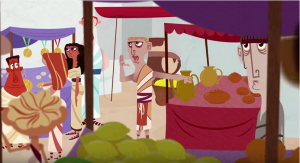
Many foreigners were brought to Rome against their will as slaves. For those who came freely, what were their motivations for travelling and immigrating to Rome according to the following text?
Seneca
Look, I pray you, on these vast crowds, for whom all the countless roofs of Rome can scarcely find shelter: the greater part of those crowds have lost their native land: they have flocked hither from their country towns and colonies, and in fine from all parts of the world. Some have been brought by ambition, some by the exigencies of public office, some by being entrusted with embassies, some by luxury which seeks a convenient spot, rich in vices, for its exercise, some by their wish for a liberal education, others by a wish to see the public shows. Some have been led hither by friendship, some by industry, which finds here a wide field for the display of its powers. Some have brought their beauty for sale, some their eloquence: people of every kind assemble themselves together in Rome, which sets a high price both upon virtues and vices. Bid them all to be summoned to answer to their names, and ask each one from what home he has come: you will find that the greater part of them have left their own abodes, and journeyed to a city which, though great and beauteous beyond all others, is nevertheless not their own.
(Seneca, ad Helviam, 6.2-3, click for link)
![]()
Imagining a Roman Street Scene
There are many statues, mosaics and even some paintings surviving from the Roman period which allow those with a good imagination to populate in their minds a Roman street with the faces of those from the past.
From Egypt
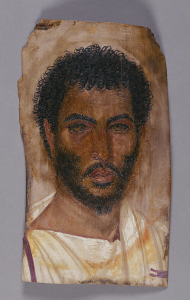
Unknown artist
Mummy Portrait of a Bearded Man, about 150 – 170, Encaustic on wood
37 x 21 cm (14 9/16 x 8 1/4 in.)
The J. Paul Getty Museum, Villa Collection, Malibu, California (source)
Attributed to the (namepiece) Isidora Master (Romano-Egyptian, active 100 – 125)
Mummy Portrait of a Woman, 100 – 110, Encaustic on wood; gilt; linen
48 x 36 x 12.8 cm (18 7/8 x 14 3/16 x 5 1/16 in.)
The J. Paul Getty Museum, Villa Collection, Malibu, California (source)
From Gaul
Dying Gaul – Capitoline Museums, Rome (credit: Julia Peters)
From Dacia
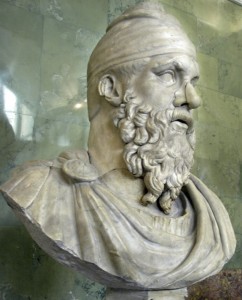
Fragment of a monumental statue of a Dacian prisoner from Trajan’s Forum in Rome, Italy. (2nd century CE), photographed by George Shuklin (source)
For Further Reading
Balsdon, J P V D. (1979), Romans and Aliens. London: Duckworth
————–(2011), Rethinking the Other in Antiquity. Princeton: Princeton University Press
Isaac, B.H. (2004), The Invention of Racism in Classical Antiquity. Oxford: Princeton University Press
La Piana, G. (1927) “Foreign Groups in Rome”. Harvard Theological Review 20: 183-403
Noy, D. (2000), Foreigners at Rome: Citizens and Strangers. London: Duckworth with The Classical Press of Wales
Roth, Roman and Keller, Johannes eds. (2007), Roman by integration : dimensions of group identity in material culture and text. Journal of Roman Archaeology, Supplementary Series 66
